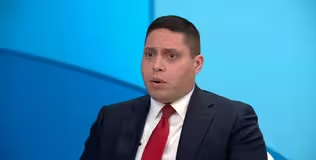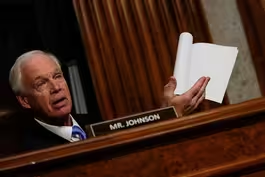
Markets plunge in wake of Trump's tariffs, trade war fears
Clip: 4/3/2025 | 11mVideo has Closed Captions
Markets plunge in wake of Trump's new tariffs and fears of global trade war
U.S. markets plunged in the wake of President Trump's announcement of new tariffs. Many stocks had their worst single day since the start of the pandemic in 2020. Leaders around the world denounced the tariffs and experts warned the president's action could risk more inflation, stall growth and even trigger a recession. Lisa Desjardins reports and Geoff Bennett discusses more with Ron Insana.
Problems playing video? | Closed Captioning Feedback
Problems playing video? | Closed Captioning Feedback
Major corporate funding for the PBS News Hour is provided by BDO, BNSF, Consumer Cellular, American Cruise Lines, and Raymond James. Funding for the PBS NewsHour Weekend is provided by...

Markets plunge in wake of Trump's tariffs, trade war fears
Clip: 4/3/2025 | 11mVideo has Closed Captions
U.S. markets plunged in the wake of President Trump's announcement of new tariffs. Many stocks had their worst single day since the start of the pandemic in 2020. Leaders around the world denounced the tariffs and experts warned the president's action could risk more inflation, stall growth and even trigger a recession. Lisa Desjardins reports and Geoff Bennett discusses more with Ron Insana.
Problems playing video? | Closed Captioning Feedback
How to Watch PBS News Hour
PBS News Hour is available to stream on pbs.org and the free PBS App, available on iPhone, Apple TV, Android TV, Android smartphones, Amazon Fire TV, Amazon Fire Tablet, Roku, Samsung Smart TV, and Vizio.
Providing Support for PBS.org
Learn Moreabout PBS online sponsorshipAMNA NAWAZ: Welcome to the "News Hour."
U.S. markets plunged today in the wake of President Trump's announcement of new tariffs.
Many stocks had their worst single day since the pandemic in 2020, losing approximately $3 trillion of value.
GEOFF BENNETT: The Dow dropped more than 1,600 points, or about 4 percent.
The tech-heavy Nasdaq, which helped fuel a market boom over the past year, fell by almost 6 percent.
And the S&P 500, which has fallen for five of the last six weeks, dropped 4.8 percent.
Foreign leaders around the world denounced the tariffs, and some warned of retaliation and trade wars.
A number of leading business groups and experts said the president's action could risk more inflation, stall growth, and even trigger a recession.
Our Lisa Desjardins begins our coverage with this report.
LISA DESJARDINS: On Wall Street, stocks plunged moments after the opening bell, part of a global decline.
Foreign markets tumbled overnight in reaction to President Trump's sweeping new tariffs.
But the president this afternoon said he wasn't worried, raising the tariffs as a chance to negotiate.
DONALD TRUMP, President of the United States: I think it's going very well.
The markets are going to boom.
The stocks are going to boom.
The country is going to boom.
And the rest of the world wants to see, is there any way they can make a deal?
LISA DESJARDINS: But from another high-ranking White House adviser, a different take.
Senior counselor for trade Peter Navarro told CNBC the tariffs are long-term and not going away tomorrow.
PETER NAVARRO, Director, White House Office of Trade and Manufacturing Policy: This is not a negotiation.
This is not that.
LISA DESJARDINS: This as headlines across time zones blared immediate reaction, "Deeply unreasonable," "Worse than the worst-case scenario," and warning of a global trade war.
World leaders, meanwhile, blasted the Trump tariffs from Europe.
URSULA VON DER LEYEN, President, European Commission: President Trump's announcement of universal tariffs on the whole world, including the European Union, is a major blow to the world economy.
LISA DESJARDINS: To allies in Asia.
SHIGERU ISHIBA, Japanese Prime Minister (through translator): We'd requested the U.S. government review its unilateral tariffs.
We are extremely disappointed and regret that they have been implemented.
LISA DESJARDINS: To a prominent competitor.
GUO JIAKUN, Chinese Foreign Ministry Spokesperson (through translator): China firmly opposes this and will take necessary measures to resolutely safeguard its legitimate interests.
DONALD TRUMP: This is liberation day.
LISA DESJARDINS: President Trump declared a national economic emergency when he introduced the tariffs in the Rose Garden just after the markets closed yesterday, insisting time would prove him right.
DONALD TRUMP: Every prediction our opponents made about trade for the last 30 years has been proven totally wrong.
In my first term, they said tariffs would crash the economy.
Instead, we built the greatest economy in the history of the world.
LISA DESJARDINS: The plan includes blanket tariffs of 10 percent on all countries that take effect Saturday, as well as what he called reciprocal tariffs, tariffs imposed in response to what Trump sees as a variety of unfair trade practices.
Those would take effect next Wednesday.
Some of the U.S.' largest trading partners are on the list, including China, hit with a new 34 percent tariff, and the E.U., hit with 20 percent.
One of the highest tariffs listed was for Vietnam at 46 percent.
Many retailers and brands have moved production to that country in recent years after U.S. efforts to discourage trade with China.
Today, stock prices for some of those companies plunged.
And some of the tariffs left economists scratching their heads.
Example, those imposed on the Antarctic Heard Island and McDonald Islands, which are uninhabited.
Notably left off the list, two of the U.S.' largest trading partners, Canada and Mexico.
The White House says they're exempt from this round for now, but are still subject to other previous Trump tariffs.
On Capitol Hill, some Republicans defended the moves.
SEN. JOSH HAWLEY (R-MO): I want more jobs in our state.
I want higher wages for our workers.
I want industry that's there to be protected.
I want a better deal for my farmers.
So if we can get that out of these tariffs, that's great.
I don't care what the banks fuss about.
LISA DESJARDINS: While Democrats universally blasted them.
SEN. PETER WELCH (D-VT): It's a disaster.
There's no economic intellectual foundation.
This is a weird digression by Trump.
That's number one.
Number two, it's going to do nothing but harm to the economy.
LISA DESJARDINS: This has left many businesses big and small to try to figure out the math.
MARC FRANKEL, Founder, Long Island Watch: The new tariffs that were imposed, I don't see how they just can't sink the entire industry.
LISA DESJARDINS: Like this Long Island watchmaker with an online business who concluded it's not good for him, running the numbers on YouTube.
MARC FRANKEL: Japan is being hit with an additional 24 percent of total value tariff.
So, on $28,200, I will be hit with a tariff of $6,768.
LISA DESJARDINS: Companies, countries and politicians are now quickly making their own calculations.
For the "PBS News Hour," I'm Lisa Desjardins.
GEOFF BENNETT: For some perspective on the tariffs, the reaction and their potential impact, let's turn now to longtime financial journalist and CNBC contributor Ron Insana.
Ron, it's great to have you here.
RON INSANA, CNBC Senior Analyst: Thanks for having me, Geoff.
GEOFF BENNETT: So I want to start with your assessment of the market reaction.
The Dow saw its biggest wipeout since 2020.
What does that say about the capacity of businesses and investors to absorb this uncertainty?
RON INSANA: Well, it was so outside the bounds of what was expected.
Most yesterday before the tariffs were announced expected, at worst-case scenario, a 20 percent across-the-board tariff, which would still be the worst-case scenario.
This was worse than the worst-case scenario with tariffs, again, against China, for instance, reaching as high as 54 percent and baseline tariffs at 10 percent.
All of this really shook confidence that the economy could avoid both higher inflation and a recession down the road if these tariffs were to be persistent.
And to complicate things, if other countries retaliated, it would even deepen what could be a global recession.
So the market responded swiftly, and it did so in no uncertain terms, sending a warning to the Trump administration that this idea as it is currently constructed is certainly not good for the economy, nor for business.
GEOFF BENNETT: Vice President Vance on FOX this morning acknowledged that this is a big change, but he said a big change is what is called for after decades of a U.S. approach that resulted in shuttered factories and manufacturing losses.
President Trump says he wants to reshore American jobs.
That's a worthy goal.
But are sweeping tariffs the way to achieve that goal?
RON INSANA: Well, many economists doubt it, because -- for a couple of different reasons.
Number one, no one knows how long the tariffs will be in effect, and if President Trump does not run for a third term, as he has at least joked or hinted in recent days, the next president could unwind those tariffs, and then businesses could end up making very expensive investments in the United States, only to have the tariffs unwound, leaving them with higher-cost production in the United States than might otherwise have been.
And so with these tariffs and the confusion around their implementation, it's very hard for businesses, either domestic or foreign, to make decisions that they can live with for the next several years.
So it adds to the confusion.
Domestic manufacturing clearly costs more than the manufacturing of certain products overseas.
And some countries quite simply will do things better or cheaper than we can here, given technological changes and other changes to the global economy that have taken place over the years.
And just another thing to add is that this was not all a function of trade policy, the so-called hollowing out of the middle class.
There were major management mistakes made in the '70s and '80s and other factors that caused the manufacturing sector in the United States in particular to lose share to foreign rivals.
And so it's not so simple as just slapping on tariffs and having companies move their production to the United States again.
GEOFF BENNETT: What does the Trump administration's approach mean for the global economic system that the U.S. has shaped and steered for nearly a century now?
RON INSANA: Well, I mean, it is a major reversion to a period which President Trump seems to be fixated on, which is the period from 1870 to 1913, when we had no income tax, relied solely on tariffs and other sorts of taxes for government revenues.
And he seems to think that was the most, one, powerful and, two, most economically prosperous time in U.S. history.
Certainly not true after.
World War II, the U.S. became the biggest economic and military power in the world.
And so it strains credulity to believe that that's a period that we should be looking back to and formulate policy around.
And I think most economists and in fact other countries would certainly agree globalization has had its drawbacks, but it's also had its benefits.
And the economy today is vastly different than in any other period.
We're heading a lot of different industries, like advanced technology.
Certainly, we'd like to see more advanced manufacturing in the United States, but broad tariffs of this magnitude in most economists' mind are simply not the way to achieve those goals.
If you have specific grievances with other countries, you negotiate first and then impose tariffs later.
That is not the way this administration is approaching trade imbalances around the world.
GEOFF BENNETT: You pointed out on social media that looking at these tariffs as economic policy alone misses an important aspect, and that is of political control, that these sweeping tariffs set up the president to be the decider of winners and losers, instead of economic competition.
Tell me more about that, the degree to which this sets up a pay-to-play dynamic that distorts the free market.
RON INSANA: Yes, well, it's interesting that you bring that up.
So Amazon, for instance, Jeff Bezos reportedly wants to buy TikTok, and so the president this afternoon suggested that they could get a great deal on TikTok from the Chinese company that owns it, ByteDance, that he might roll back tariffs on China.
That would benefit any domestic purchaser of TikTok, whether it's AppLovin, which is a company that has recently become popular on Wall Street, Amazon, or any other.
And, yes, he can pick those companies, those industries that are exempted from the tariffs, and, effectively, those who play ball with the president might get favorable treatment, and those who don't would get unfavorable treatment.
So it sets up almost, if you will, a crony capitalism-type situation in which those in favor benefit, those out of favor lose.
And not only that.
That's true with other countries as well.
Whoever capitulates first will get a break, and whoever retaliates first will get hit even harder.
In fact, Treasury Secretary Scott Bessent said early this morning, and I believe yesterday afternoon, that other countries shouldn't retaliate.
Well, we already heard that many countries will, and so that could just escalate the trade war further and complicate what is already, I would argue, a chaotic situation.
GEOFF BENNETT: Ron Insana, great to speak with you.
Thanks for being here.
RON INSANA: Thanks for having me.
Conservative lawyer on Trump's use of executive power
Video has Closed Captions
Clip: 4/3/2025 | 8m 25s | Conservative constitutional lawyer weighs in on Trump's aggressive use of executive power (8m 25s)
GOP Sen. Johnson says he supports tariffs but has concerns
Video has Closed Captions
Clip: 4/3/2025 | 7m 59s | GOP Sen. Johnson says Wisconsin bracing to see 'how painful' tariff fallout will be (7m 59s)
Taiwan boosting defenses to resist Chinese aggression
Video has Closed Captions
Clip: 4/3/2025 | 11m | How Taiwan is boosting its defenses to resist Chinese aggression (11m)
Trump resumes family detention in immigration crackdown
Video has Closed Captions
Clip: 4/3/2025 | 7m 2s | Trump administration resumes family detention in immigration crackdown (7m 2s)
Providing Support for PBS.org
Learn Moreabout PBS online sponsorship
- News and Public Affairs

FRONTLINE is investigative journalism that questions, explains and changes our world.

- News and Public Affairs

Amanpour and Company features conversations with leaders and decision makers.












Support for PBS provided by:
Major corporate funding for the PBS News Hour is provided by BDO, BNSF, Consumer Cellular, American Cruise Lines, and Raymond James. Funding for the PBS NewsHour Weekend is provided by...



